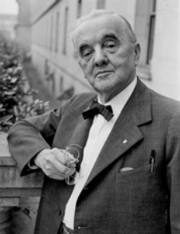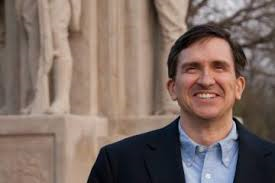 Some seventy years after his death on this day in 1944, the spirit of legendary Senator George W. Norris, a progressive and fiercely independent-minded Republican lawmaker portrayed by future President John F. Kennedy in his 1957 Pulitzer-prize winning “Profiles in Courage,” is being rekindled in Nebraska’s closely-watched U.S. Senate race in the write-in candidacy of political activist Dan Buhrdorf of the fledgling Tax Wall Street Party.
Some seventy years after his death on this day in 1944, the spirit of legendary Senator George W. Norris, a progressive and fiercely independent-minded Republican lawmaker portrayed by future President John F. Kennedy in his 1957 Pulitzer-prize winning “Profiles in Courage,” is being rekindled in Nebraska’s closely-watched U.S. Senate race in the write-in candidacy of political activist Dan Buhrdorf of the fledgling Tax Wall Street Party.
One of eight U.S. Senators profiled in Kennedy’s best-selling book, Norris was recognized by the future president for his courage in opposing an egregiously autocratic and iron-fisted Speaker of the House of his own party during his ten years in that body and for opposing the arming of U.S. merchant ships prior to America’s entry in World War I.
In his award-winning narrative, the young Massachusetts senator also cited the insurgent Republican, fondly remembered as the “Father of the TVA” — the Tennessee Valley Authority, one of the greatest infrastructure projects in American history — for courageously championing New York’s Al Smith, a devout Catholic, for the presidency in 1928. It was a particularly gutsy thing to do in heavily-Protestant Nebraska.
Risking the wrath of his party’s vengeful and mean-spirited leadership — a party that never tired of trying to prematurely retire him from public life — Norris again bucked his own party in backing Democrat Franklin D. Roosevelt during the Great Depression. The intrepid Nebraskan knew instinctively that FDR was fighting for the common man, the ordinary citizen struggling to survive in an economy dominated by a powerful financial oligarchy that not only destroyed the U.S. economy, but the entire global economy, in a speculative frenzy fostered by the Bank of England’s Montagu Norman and widely-remembered as the “Roaring Twenties.”
Nebraska, which gave the laissez faire-leaning Herbert Hoover a whopping 63 percent of the vote four years earlier, was a solidly Republican state when Norris courageously endorsed Roosevelt in 1932, helping in no small measure to swing that conservative-leaning, heavily agricultural state into the Democratic column for the first time in sixteen years.
A grateful FDR later described the insurgent Nebraskan as “the very perfect, gentle knight of American progressive ideals.”
Truer words were never spoken. The low-key and unassuming Norris was one of the greatest U.S. Senators in American history. Like the Tax Wall Street Party’s soft-spoken and modest Dan Buhrdorf, the forward-looking Nebraskan was also as gentle and decent as they come.
The country sorely needs another George W. Norris today.
Norris was also fearless, a real fighter willing time and again to risk his political career for the sake of the country’s better self.
Raised in near poverty after his father died when he was only four, Norris spent his entire congressional career — a vocation that spanned nearly forty years —fighting for family farmers and other working-class Nebraskans while battling Wall Street and the country’s other entrenched and elite financial interests.
The mild-mannered yet combative Cornhusker — the kind of honest and selfless individual Greek philosopher Diogenes apparently set out to find — provided the kind of leadership the nation so desperately needs today. As he frequently demonstrated, Norris could have cared less about party loyalty; he worried even less about his own political survival. Throughout his long congressional career, he always did what he thought was right. A true statesman, he chose a career in politics to serve the people. A humble and modest public servant, he died in September of 1944 no better off financially than he was when first elected to Congress more than forty years earlier. Remarkably, he even refused to accept a congressional pension.
Then again, the feisty Nebraskan was elected to Congress long before it became a playground for the rich and famous, an era when voters still occasionally sent a middle-income or working-class citizen — somebody like Mr. Buhrdorf — to represent them on Capitol Hill. Unlike today’s lawmakers, Norris didn’t spend all of his time “dialing for dollars” from grimy gamblers and seedy speculators on Wall Street, as well as other financial freeloaders looking for an edge or inside advantage over their competitors, almost all of whom can be reasonably described as paper-shuffling profiteers in an increasingly low-wage and jobless economy virtually void of any genuinely productive economic activity.
Believing that it would be a “tragedy” if Franklin D. Roosevelt was denied a fourth term, the 83-year-old Norris was serving as honorary chairman of organized labor’s National Citizens Political Action Committee at the time of his death in September of 1944.

The Tax Wall Street Party’s Dan Buhrdorf vows to remain in Nebraska Senate race as a write-in candidate.
Like the little-known Buhrdorf, Norris despised Wall Street and once unfurled an eight-foot-square chart on the Senate floor showing what he described as the “Spider Web of Wall Street,” illustrating the fact that J. P. Morgan and seven other major financial institutions controlled most corporations and industries in the United States through interlocking directorships and so-called “holding companies.”
Wall Street executives, he said in a ringing speech in 1917, shortly before the United States entered World War I, “sat behind mahogany desks” plotting how they could profit from the miseries of war. It’s something they’ve continued to do ever since.
“You shall not coin into gold the life blood of our brothers,” declared Norris, echoing fellow Nebraskan William Jennings Bryan.
The great crusading journalist George Seldes couldn’t have said it better.
Then, as now, Wall Street was like an old giant oak tree in the forest — sustained almost entirely by the largesse of the Federal Reserve’s private banking cartel — blocking the Earth’s natural sunlight and soaking up all of the water desperately needed by the maple trees and other plants living in its shadow. Thanks to the “too big to fail” banks, that’s precisely the predicament in which most middle-class and low-income citizens find themselves today
Sadly, it’s also the place where many small and medium-sized businesses found themselves stuck in the aftermath of the 2008 financial meltdown of Wall Street’s making. In the eyes of the rich and powerful, the reckless casino capitalists who destroyed the U.S. economy six years ago and have prospered beyond their wildest dreams ever since, most Americans are nothing more than shrubbery, the lowest form of plant life struggling for subsistence.
One of the most principled individuals to ever serve in the U.S. Senate, Norris selflessly spent most of his time in Congress painstakingly dealing with legislation that affected ordinary citizens — a concept almost entirely foreign to the privileged “Millionaire’s Club” of both parties that dominate the Beltway today. Unlike Norris, most Senate and House members today don’t even bother to read any of the legislation they’re voting on — let alone write it. They leave that mundane task to the lobbyists, the same folks who fund their campaigns.
Norris, on the other hand, worried incessantly about the details of any and all pending legislation before the U.S. Senate and how it might affect the average citizen, laboriously scrutinizing and debating any new bills in both committee hearings and on the Senate floor.
Unlike today’s lawmakers, the vast majority of whom are children of privilege who’ve never experienced the anxiety of living paycheck-to-paycheck or ever spent a sleepless night worrying about how they would make their next mortgage payment or pay an electric bill, the low-key Nebraskan didn’t spend the vast majority of his time running for re-election. Senator Norris, who defeated his Democratic and Republican rivals to win a fifth Senate term as an independent in 1936, actually did his job — and did it well. Consequently, his campaigns for reelection were woefully neglected and usually waged on a last-minute, shoestring budget.
His Senate duties always took priority and that’s precisely why he lost his bid for a sixth term in 1942. Again running as an independent, free of any party ties, the aging lawmaker simply stayed in Washington too long that year poring over legislation and waited until the final weekend of the campaign to return to his native Nebraska.
If there was a stairway to heaven, Norris climbed it. And he scaled it gracefully.
Dan Buhrdorf, a lifelong educator and Lincoln resident who narrowly failed to qualify for the November ballot despite collecting nearly 5,700 signatures in the state’s three congressional districts — 4,880 valid signatures were required — believes his write-in candidacy can have a positive impact this autumn by forcing his opponents to address the substantive issues facing the country.
If last Monday’s televised debate at the Nebraska State Fair in Grand Island was any indication, he might be right. Championing a one percent tax on Wall Street transactions, a Medicare-for-All healthcare program and agricultural parity while boldly calling for the nationalization of the Federal Reserve to provide public credit for the nation’s mounting infrastructure needs, many observers believe that Buhrdorf won that debate hands down.
An articulate advocate of the woefully neglected and long-buried American System of Political Economy — the Hamiltonian policies on which this nation was founded — Buhrdorf, offering an FDR-inspired economic program designed to strengthen and expand America’s battered and dwindling middle-class, vastly outperformed right-wing Republican Ben Sasse, Democratic nominee Dave Domina and independent candidate Jim Jenkins, a wealthy Callaway rancher, in the August 25th debate, which was sponsored by the Nebraska Cattlemen and Rural Radio Network.
Buhrdorf, moreover, was the only candidate in the Heartland Events Center last Monday who offered realistic solutions to the country’s seemingly never-ending economic decline, a post-recession economy in which most Americans are worried, pessimistic and worse off than they were before the financial crisis caused by Wall Street’s avarice and irresponsible recklessness.
According to most economists, the “Great Recession” supposedly ended five years ago, but Buhrdorf — and most Nebraskans — know differently.
At first blush, Nebraska might seem like an improbable place in which to launch something as refreshingly bold and imaginative as the Tax Wall Street Party — some might even call it radical — but the state’s rich and colorful political history says otherwise. Though considered a solidly-red state by today’s ridiculously polarized standards, Nebraskans have long recognized when somebody is fighting for them. It was evident in the case of populist William Jennings Bryan at the turn of the century and it was doubly true in George Norris’ time.
If we’re really lucky, it’ll be true again later this year.
Nebraskans should take a pen to the polls on November 4th.



Thank you for the informative history lesson and your insight about the Dan for Nebraska US Senate campaign! Your readers can find out more about Dan Buhrdorf’s campaign and platform that will lead us into a 21st Century New Deal type of economic recovery that will work for all Americans! DanforNebraska.com and Facebook https://www.facebook.com/danfornebraska. Thanks again, Mr. Richardson – great article!
Pingback: Lincoln Journal Star Endorses Independent Jim Jenkins in Nebraska Senate Race